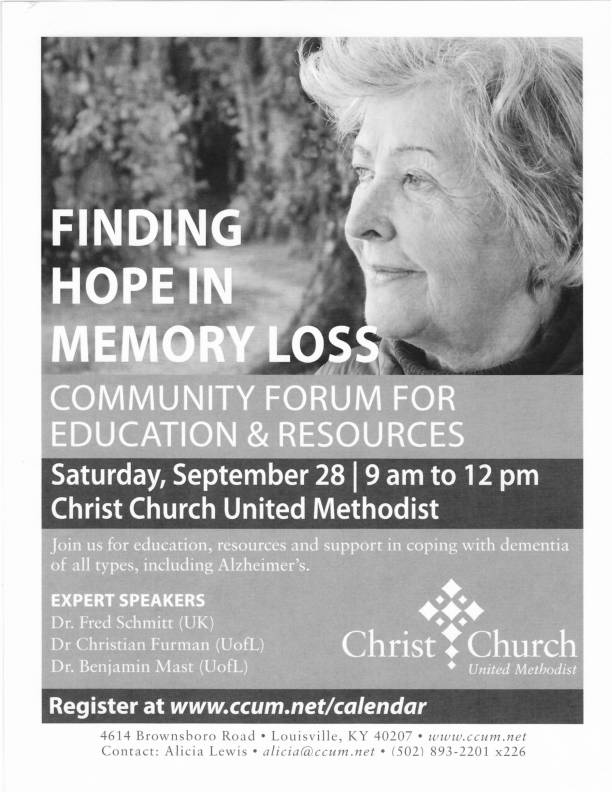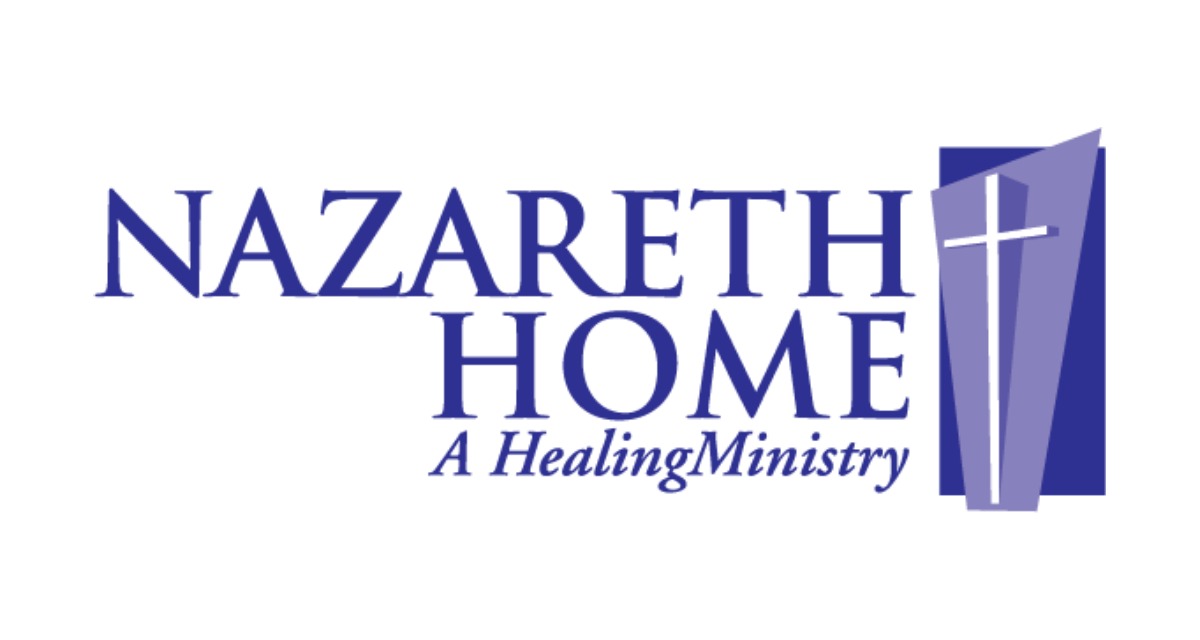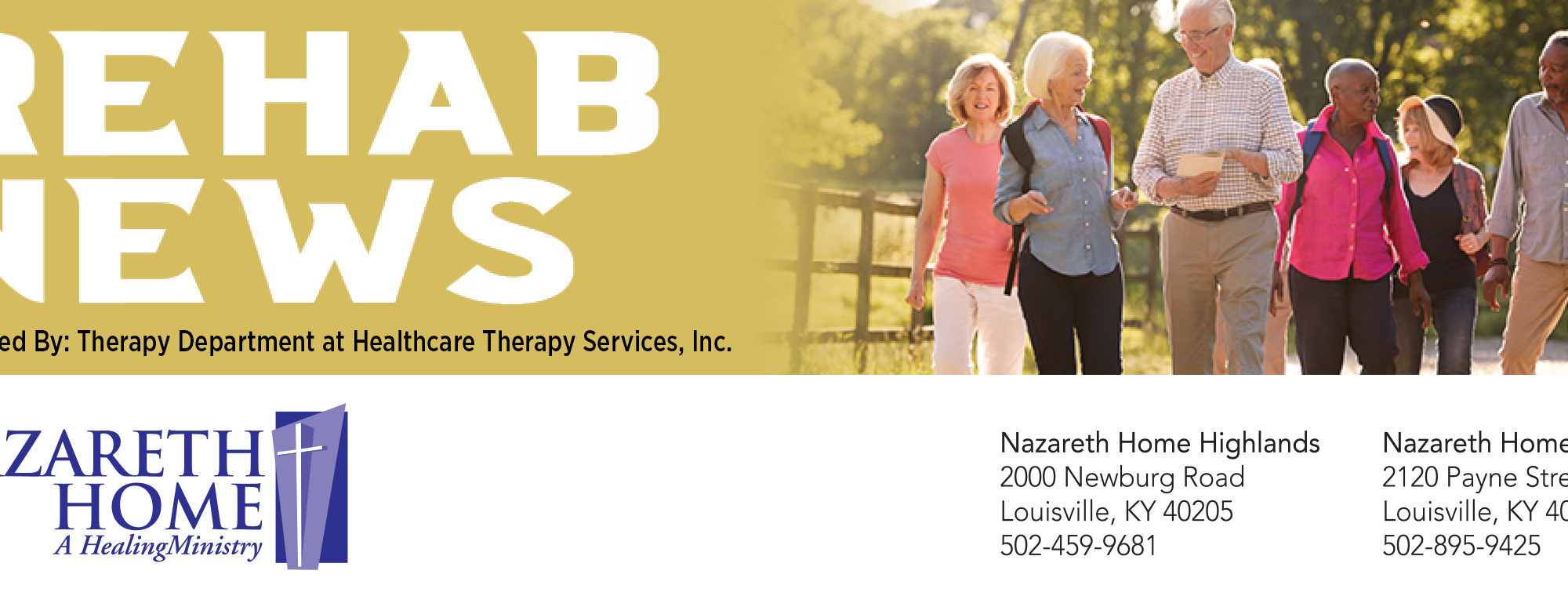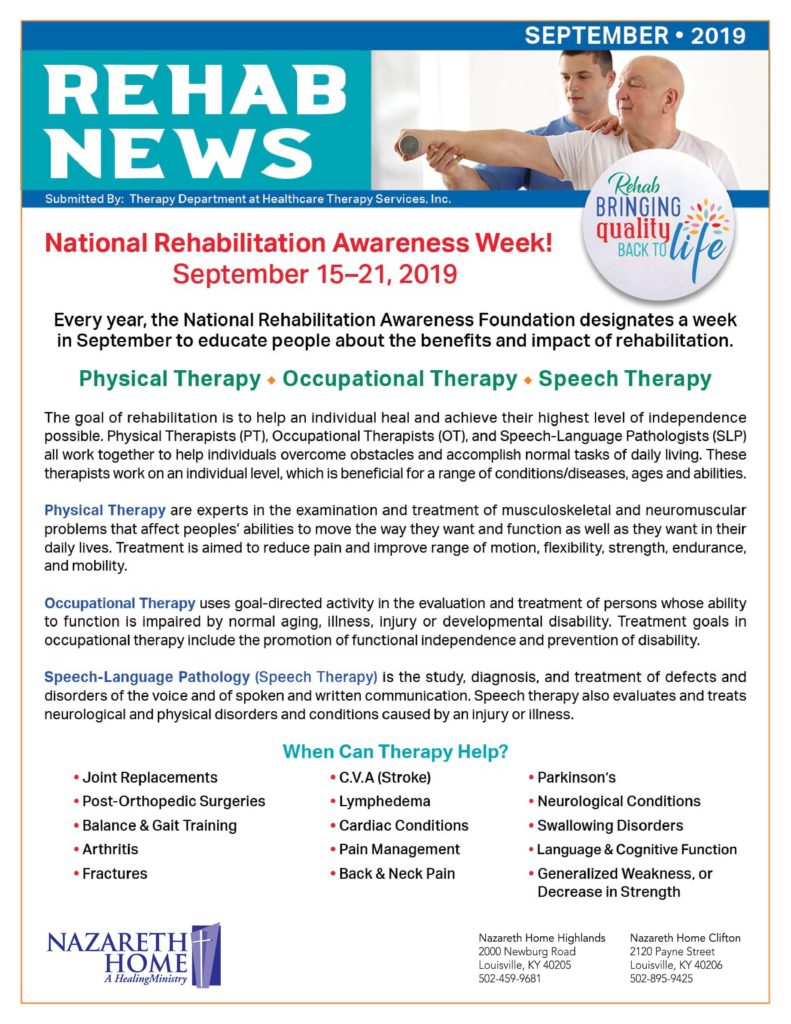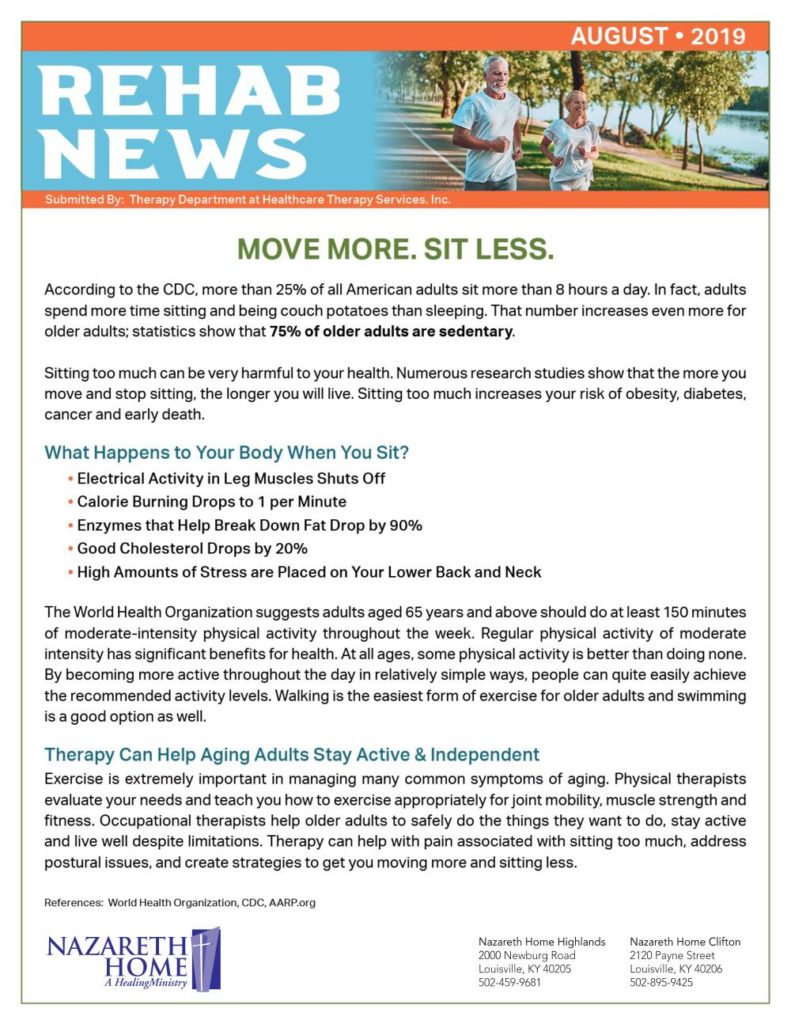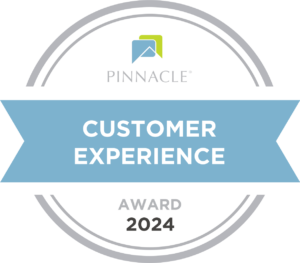Rehabilitation to Home
Rehabilitation to Home
Next week is National Rehabilitation Awareness Week, a time to acknowledge the benefits of rehab programs, and the positive impact these services make in the lives of people in need. At Nazareth Home, our person-centered Rehabilitation to Home program accelerates healing and improves quality of life.
We look at the entire person, not just the condition – what was life like before the diagnosis and how can we get the elder back to that standard of living. We have experienced, compassionate therapists committed to helping the elders live the life they want.
We believe the best way to get someone back on their feet, faster, is to offer them an environment where they can focus on healing. Our customized care plans involve the elders and their families, caregivers and therapists to provide efficient, supportive and responsive care tailored to the individual needs of each patient.
Our goal is to aid elders in achieving their own, individual, best level of health, well-being, ability and independence in their daily lives. We desire to not only heal the injury, but also for elders to be successful when they leave Nazareth Home so they can live their best life.
Some Companies Offer a New Benefit: Payroll Advances and Loans
Some Companies Offer a New Benefit: Payroll Advances and Loans
Source: The Wall Street Journal
By Anne Tergesen
September 2, 2019
A growing number of companies are helping workers gain access to payroll advances and loans, reflecting concern over the impact money problems are having on productivity levels and worker retention.
Employers including Walmart Inc. have recently added these services. The aim is to help cash-strapped employees, many with damaged credit, cover unexpected expenses without resorting to high-cost debt.
“Employers have woken up to the fact that a majority of workers are having a lot of trouble simply getting by, never mind getting ahead,” said Sophie Raseman, head of financial solutions at Brightside, a company Comcast Corp. co-founded that provides financial guidance to workers and is testing payroll loans with some corporate clients.
Workers typically access the services online. The payroll-advance programs generally give employees the option to accelerate a portion of their next paycheck for a fee that often amounts to a few dollars. The loans are typically a couple thousand dollars, and are repaid through automatic payroll deductions over a few months to a year or longer. Approval and interest rates, generally 6% to 36%, often depend on factors including a borrower’s credit score.
Because the services deduct repayments from workers’ paychecks before the money goes to their bank accounts, default rates tend to be low.
According to an Employee Benefit Research Institute survey of 250 employers last year, 12% offer accelerated pay. The same percentage offer short-term loans repaid through payroll deductions. Another 4% and 6% plan to add the services, respectively.
Lauren Saunders, associate director of the National Consumer Law Center, said payroll-advance services may create “a cycle of chronic early spending.”
Companies, meanwhile, are responding to data that indicate American workers are financially stressed. While incomes have been stagnant for many, expenses for items including health care and education have risen.
Employers are concerned about the impact on productivity and turnover. Research by Todd Baker, a senior fellow at Columbia University’s Richman Center for Business, Law and Public Policy, looked at 16 companies in the U.K. that offered payroll loans and found that borrowers had, on average, an annualized attrition rate 28% lower than the rate for all employees.
Mary Haynes, chief executive of Nazareth Home, which runs long-term-care facilities in Louisville, Ky., said the company began offering accelerated paychecks through PayActiv Inc. two years ago after realizing many of its staff were incurring late fees and using payday loans. PayActiv works with 500 employers, including Walmart.
Of Nazareth’s 400 employees, 338 are enrolled in PayActiv and 280 use it regularly, Ms. Haynes said.
The benefit attracts workers and saves Nazareth money, Ms. Haynes said, by “practically eliminating” its use of a staffing agency some workers preferred because the agency provided access to paycheck advances.
Typically, payday loans charge $15 for every $100 borrowed. Bank overdraft fees often cost about $35. In contrast, PayActiv charges $5 per pay period when an employee uses the service, which also includes financial counseling and online bill payments.
Some point out that a $5 fee can equate to a high annualized percentage rate on a small short-term loan.
State officials also have concerns. Regulators in 10 states, including New York, are investigating whether the payroll-advance services are violating state banking laws. The companies that provide this service maintain that they give employees access to money they have already earned and aren’t lenders.
Robyn McGuffin, a medication technician at Nazareth Home, says PayActiv has helped her avoid late and overdraft fees of as much as $80 a month.
Ms. McGuffin, 36 years old, says she typically uses PayActiv once or twice per pay period, generally for bills due before her next paycheck arrives. The Louisville resident also used it to buy a new car battery and cover her fiancé’s share of the household expenses when he was temporarily out of work due to a medical emergency.
By avoiding late fees, Ms. McGuffin, who earns about $16 an hour, said she has been able to splurge on the occasional restaurant meal or toy for her daughter. “I don’t freak out as much about bills, because I know I have the option to access money if I need to.”
Some employers pair loans or accelerated paychecks with online tools to help workers budget, reduce debt and amass emergency savings.
Walmart introduced salary advances in late 2017. It has seen employees rely less on payday loans and bank overdrafts, said David Hoke, who oversees health and well-being.
Employees pay $6 a month to use PayActiv. It is embedded in an app called Even, which also includes a budgeting service that nudges users to save surpluses. Walmart covers the cost for one month per quarter and caps the amount workers can accelerate at 50% of pay. Of the company’s 1.4 million workers, 380,000 are frequent app users, Mr. Hoke said.
For those in need of larger sums, some employers offer loan services that typically advance as much as $5,000, with repayments deducted from workers’ paychecks over four months to a couple years.
Lender Kashable approves “more than 60%” of applicants, said co-CEO Einat Steklov. It considers factors including job tenure and credit scores.
The average user has a subprime credit score and pays an annual interest rate of about 20%, Ms. Steklov said. Kashable’s default rate is 5%. Borrowers who leave their jobs before repaying in full generally switch to automated bank transfers.
Pima County, Ariz., has offered its 7,000 employees Kashable loans since 2016. Nearly 500 workers, many with credit scores below 650, have borrowed an average of $2,000 each, said county supervisor Richard Elías.
Mr. Elías said nearly half reported using the loan to pay off higher-cost debt, and many purchased or repaired cars.
“Anything we can do to make the economic lives of our workers more stable benefits us” in the form of higher productivity, said Mr. Elías.
September Rehab News
WAVE3: Walk to End Alzheimer’s at Waterfront Park
Walk to End Alzheimer's at Waterfront Park
WLKY: Walk to End Alzheimer’s at Waterfront Park
Walk to End Alzheimer's at Waterfront Park
True Doors welcome elders home
True Doors welcome elders home
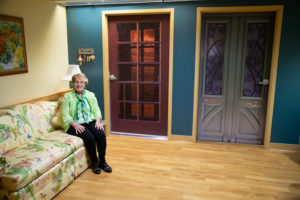 “The front door continues to appeal to our sense of arrival. Call it the ceremony of coming home,” writes Akiko Busch in his book Geography of Home: Writings on Where We Live.
“The front door continues to appeal to our sense of arrival. Call it the ceremony of coming home,” writes Akiko Busch in his book Geography of Home: Writings on Where We Live.
Isn’t it so true – how a simple door can give us that sense of arrival and peace and make us feel at home. That sense of arriving home rests your soul and eases your mind. Walking through your front door makes you feel safe; it brings you comfort and a sense of relief. It’s where you can be you, and the outside world doesn’t matter so much.
Now imagine that little by little, you are beginning to forget things. Imagine that sometimes during the day you are confused or lost, things look unfamiliar yet the same. You are not sure where to go. Through the unfamiliar, you see your door, and it gives you a flicker of a memory. You know it’s your door, the one to your home, your place of comfort, where you belong. That door speaks to you and calls to your senses that yes, you are in the right place. You are where you belong.
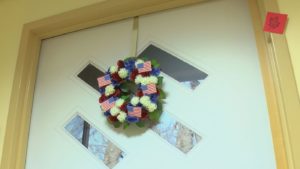 This is exactly what True Doors provide to the elders living on Charity Court, Nazareth Home’s Memory Care neighborhood. The decals placed over the residents’ doors look like a door from their past home or another door of the elder’s choosing. It creates a warm and familiar environment, bringing elders’ identities to the forefront while creating an atmosphere that feels more like home.
This is exactly what True Doors provide to the elders living on Charity Court, Nazareth Home’s Memory Care neighborhood. The decals placed over the residents’ doors look like a door from their past home or another door of the elder’s choosing. It creates a warm and familiar environment, bringing elders’ identities to the forefront while creating an atmosphere that feels more like home.
The decals help trigger memories and stimulate conversation. It gives elders a sense of pride and makes their home on Charity Court feel less institutionalized and more home-like. The doors also enable elders to remember how to “get home” to their rooms and avoid becoming disoriented.
True Doors is at the center of our person-centered care. Elders living on Charity Court have the choice of 500 designs, or they can submit a photo of a real door for a custom decal. Their choice in a door tells us a little bit about the elder’s life, or a little about their likes and dislikes, allowing us to get to know them better.
Home means something different to each of us, and our idea of home shapes our place in this world. And it all begins at the front door. The True Door decals welcome our elders home and bring a smile to everyone’s face.
Louisville senior care facility using innovation to improve quality of life
Louisville senior care facility using innovation to improve quality of life
Source: WAVE3
By Sean Baute
August 13, 2019
LOUISVILLE, Ky. (WAVE) – A national conference revolving around advancements in senior care came to Louisville recently. It’s part of a network of facilities looking to work together to make life better for an aging population. Together, they’re tackling problems that don’t happen overnight.
“Nobody wakes up and says, I’m going to move into a nursing home today,” said Michael Buckman, chairman of Nazareth Home. “That is never going to happen.”
At Nazareth Home in Louisville, innovating senior care, and sharing their success is the mission.Michael Buckman, Director of Development at Nazareth Home (Source: Doug Druschke, WAVE 3 News)
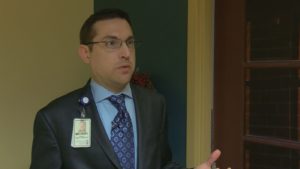 “We want to make sure it’s an empowering environment,” Buckman said. “We want to make sure that all of their wishes are honored, and really we want to free them to be who they are.”
“We want to make sure it’s an empowering environment,” Buckman said. “We want to make sure that all of their wishes are honored, and really we want to free them to be who they are.”
At Nazareth Home in Louisville, innovating senior care, and sharing their success is the mission.
It’s programs such as True Doors, that are the result of adapting to a specific problem such as dementia care. True Doors allows to residents to pick out a door for their room.
“We’ve had families come in who say, oh my gosh, mom got her door, and first thing she wanted to do was show me when we got here,” said Buckman. “It is about lessening the anxiety, lessening the isolation, and just really telling the story about that elder.”
Some of the doors of the Nazareth Home residents are duplicates of the homes where they once lived.
The decals could be a door from a list, or it could be of the door from the house they just came from.
“They know exactly when they moved in there, how long they lived there,” Buckman added.”They have an incredible sense of pride in this community.”
True Doors is based in Europe, but it’s partnerships across the United States as well that make senior care innovation possible in Louisville.
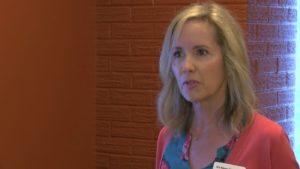
“Getting to come out and spend time in a community like this, it just reminds me how important the work we do is,” said Kristi Stoglin, Vice President of Client Success for It’s Never 2 Late.
It’s Never 2 Late is based in Colorado, and offers palliative care patients a digital portal to another world, or a previous memory of their own.
“People like Nazareth Home, who just want to do the absolute best that they can for their elders, and offer that kind of engagement every day, that’s where It’s Never 2 Late came from and what we’re still about today,” said Stoglin.
A Career of a Lifetime
A Career of a Lifetime
A career at Nazareth Home is more than just a job; it’s a mission. Our staff members passionately believe in what they do and are dedicated to providing excellent care to elders.
Our team members feel called to their positions and take pride in their work. Therefore, we strive every day to create an environment where they can thrive, have fun and embrace their mission to serve others.
Making a difference in the lives of elders and their families, being empowered to learn and grow each day and our ongoing goal to improve the workplace are just a few reasons staff give for their tremendous job satisfaction.
“A part of our mission at Nazareth Home is to embrace our staff,” said Jennifer Smith, human resource director or Nazareth Home. “We work together to provide not only the elders with the best person-centered care possible, but also our staff. Happy staff makes a happy workplace.”
If a career in senior living speaks to your soul, we may be a good fit for you. Explore our employment opportunities here.


